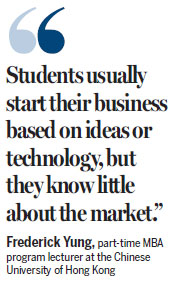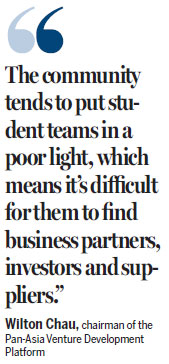Starting a business - failure tells you more than success
|
A group of students at Hong Kong University. With an increasing number of graduates taking the plunge in starting their own business, experts worry that young entrepreneurs don't have ample entrepreneurship skills to achieve their aims. Parker Zheng / China Daily |
The scorching summer heat is here, so is the graduation season as hoards of university students, having newly donned their mortar board hats, storm the jobs market.
With the push for younger people to take the plunge in business gathering momentum, many graduates have answered the call to try their luck in startups, deviating from the norm of merely taking up work or harnessing their academic clout by pursuing education overseas or entering graduate schools.
However, according to industry experts, the rate of student startups that are seen being able to make the grade has been extremely low - both in Hong Kong and on the Chinese mainland. They say the main challenge confronting budding entrepreneurs is a dearth of practical business models and a more realistic understanding of the market.
"Students usually start their business based on ideas or technology, but they know little about the market," says Frederick Yung, a part-time MBA program lecturer at the Chinese University of Hong Kong (CUHK).

Citing mobile-phone applications - a popular sector among student startups - he reckons that young entrepreneurs tend to focus on product design and computer technology, and lack any knowledge of how to establish a sustainable and effective profit model.
Based on his experience in teaching "New Venture Business Project" - one of CUHK's entrepreneurship education and training courses - Yung says some students plan to profit from built-in advertisements, but attracting advertisers initially needs a large base of users, a process that they usually underestimate.
Besides being over-optimistic, students are unfamiliar with internet-related laws and regulations. He points out that the development of many apps relies on the big data collected, such as social network apps, so students need to collect as much data as possible, but they aren't sure how much data can be gathered under the data privacy law.
In Shenzhen, the same problems crop up, posing immense obstacles for innovation and high-tech startups.
Statistics from the Guangdong Human Resources and Social Security Bureau put the success rate of startups involving university graduates at just 1 percent.
"Students often are at a loss when it comes to executing a target to perfection and tend to overlook potential risks," says Guo Xiaojuan, administrative executive of Hofan Group, one of the main investors of "China University Business Challenge" - an annual innovation and startup competition among universities with hundreds of teams participating.
"And they have almost zero experience, so they don't understand the market," Guo adds. "This can lead to vital mistakes."
She notes that some market analyses rely on small-scale surveys within the campus which, sometimes, are not the same as those conducted outside. Therefore, the company suggests that, starting from this year's competition, case analysis-based training will be provided for students and their teachers in order to prove their executive ability.
Such training is just as important as financial aid, Guo stresses.
The Shenzhen authorities allowed college students to suspend tertiary education two years ago to encourage them to enter business, and some of the city's colleges have been vigorously exploring entrepreneurship education since.
In 2012, Shenzhen Polytechnic set up its school of entrepreneurship and innovation, with 97 students graduating this month. But, only 11 of them have so far started their own business.
Shenzhen University also launched entrepreneurship education earlier this year, bringing in alumni, venture investors and successful businessmen to guide its students in the ethics and management of business.
In the SAR, educators have also realized the significance of offering enterprise startup education.
The Hong Kong Federation of Youth Groups last year issued a report based on a survey of 217 young entrepreneurs, saying one of the key reasons for the failure of some startups is their managers' inability to make accurate and timely estimates of product quality and market demand, and having to keep trying various business models.
It says young entrepreneurs don't have ample knowledge of entrepreneurship before starting a business.

Hong Kong Baptist University, City University of Hong Kong and Tung Wah College have also set up entrepreneurship-related courses at different levels recently.
However, such lessons are a formidable task for both students and teachers.
Wilton Chau, chairman of the Pan-Asia Venture Development Platform - a bridge between students and venture investing - believes that studying successful cases, which most entrepreneur education course have adopted, is of little use.
While successful cases can light up students' enthusiasm in devoting themselves to startups, those who had failed to make it can offer them the most useful experience on the road to becoming entrepreneurs, Chau notes.
But the difficulty is that most people are unwilling to share the experience of why their projects failed. In addition, teachers lack startup experience, he adds, and some teaching material comes from Western textbooks, which may not be applicable to the Asian market.
As an experienced investor, Chau admits that he rarely puts his money into a student startup. "The community tends to put student teams in a poor light, which means it's difficult for them to find business partners, investors and suppliers."
Investors, on the other hand, are also worried about students' lack of sales channel resources.
However, Chau still believes that proper training can lift the success rate remarkably or "help them understand the reasons when they fail".
"There're many other barriers in developing a startup, and students need to know how to conquer them one by one," he says.
grace@chinadailyhk.com
(HK Edition 07/26/2016 page9)



 Print
Print Mail
Mail


